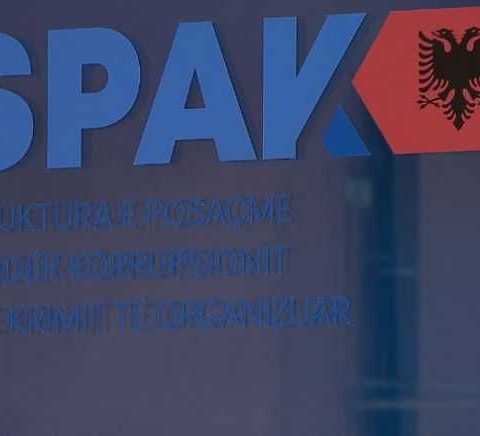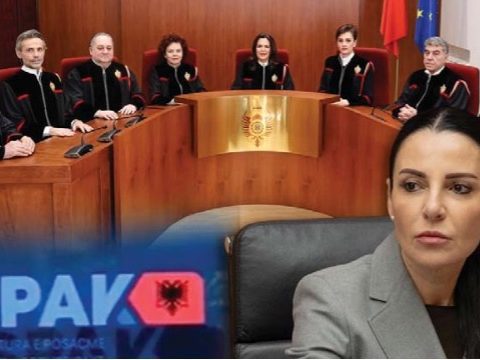By Vilson Blloshmi
In a country where education is often seen as a ticket out of poverty and a bridge toward European integration, the higher education system in Albania is quietly unraveling under the weight of corruption, nepotism, and institutional indifference. Migen Qiraxhi, a well-known civic activist and Project Manager at the organization Qëndresa Qytetare, offers a stark and personal testimony about the extent to which corruption has penetrated public universities. Drawing on his own experience as a student and as a watchdog advocate for education reform, Qiraxhi sheds light on how the formal mechanisms designed to protect ethics and academic standards are not only dysfunctional — they are, in many cases, entirely inactive. According to him, Albanian universities are plagued by a culture of silence, fear, and political influence that has normalized abuse and punished integrity.
Accountability Mechanisms Exist, But Don’t Work
Albania’s public universities formally maintain structures for upholding ethics and handling misconduct—such as Ethics Committees, Academic Senates, and student complaint offices. However, Qiraxhi argues these bodies rarely function as intended. “When I was a student, a professor, her daughter, and son-in-law were all teaching courses at the same department. Each gave two classes, meaning a single family controlled six grades per semester. How can students feel safe to report anything in such a closed system?” Such examples of nepotism, he adds, are not isolated incidents but symptomatic of a broader academic culture where personal connections trump merit and fairness.
Anti-Corruption Coordinators? Nowhere to Be Found
Despite broader governmental pushes for anti-corruption, universities have not been included in the national framework for anti-corruption coordination. “We reached out to the Ministry of Justice, submitted reports and concerns, and even suggested appointing anti-corruption coordinators for universities — we were ignored,” Qiraxhi says. The lack of designated officers to handle reports of bribery, favoritism, or misconduct means students and staff have no clear or trusted channel to seek justice within the academic environment.
Ethics Codes: Paper Rules with No Application
While universities boast codes of conduct and ethics regulations that are publicly available, these documents remain purely symbolic. “No professor has ever been expelled or sanctioned by an Ethics Committee. These structures exist just to tick boxes—for accreditation, funding, or international partnerships,” explains Qiraxhi. Rather than acting as guardians of academic integrity, these bodies are passive, bureaucratic shells that do little to confront real violations or protect whistleblowers.
Lack of Training and Culture of Silence
In countries with mature educational systems, ethics training is a staple for both faculty and students. Not so in Albania. “People assume that holding a PhD means you already understand integrity. But that’s a false assumption — misconduct happens even among the most credentialed,” says Qiraxhi. He highlights a dangerous trend: even when colleagues are aware of corruption, they rarely speak out. Reports only surface when scandals break publicly. This pervasive silence creates an environment where abuse goes unchallenged and good actors are marginalized.
Students Know the Problem — and Still Stay Silent
Perhaps most alarming is how normalized corruption has become among students. Surveys conducted by Qëndresa Qytetare revealed that 73% of students are aware of corruption — often through friends or family — but less than 1% report it. “Corruption is a deal between two people: one gains a grade, the other gets money. And when both parties benefit, who’s left to complain?” Qiraxhi explains. He points to a vicious cycle: professors previously arrested for bribery return to teaching, and students witness firsthand that the system protects the abuser, not the victim. Over time, fear gives way to resignation.
Forms of Corruption: Money, Mandatory Textbooks, and Sexual Favors
Corruption takes many forms in higher education. Students often pay directly for grades or are forced to buy textbooks written by their own professors, some of which are of questionable academic quality. In more serious cases, there have even been allegations of sexual favors exchanged for passing grades. “Even university administrations abuse student fees for luxury spending rather than services,” Qiraxhi says, citing a public scandal at the Agricultural University in Tirana, where funds were misused without consequence. This entrenched misconduct not only erodes student dignity but breeds a dangerous sense of impunity.
Political Influence: The Unseen Hand Controlling Campuses
Universities in Albania are far from independent. Qiraxhi asserts that politics has never truly taken its hands off academia. “Elections for university rectors have even seen involvement from criminal gangs. Higher education is treated like a resource — for jobs, titles, influence. But more than that, it’s controlled to suppress its potential,” he says. A thriving, independent university could become a hub for student organizing, public criticism, and alternative political thought—thus posing a threat to a tightly controlled political ecosystem. “Universities are deliberately weakened to prevent them from becoming uncontrollable centers of dissent.”
Unchecked Plagiarism and Lack of Transparency
Despite government promises to vet academic titles and launch a digital portal for dissertation access, nothing meaningful has materialized. “Only 12 professors responded to the portal initiative. The rest kept their work hidden from the public,” says Qiraxhi. While some faculties, like Medicine or the Polytechnic University, use plagiarism detection tools, the majority still do not. This lack of academic transparency and quality control has allowed plagiarism to spread at all levels—from bachelor theses to PhDs—while institutions continue to reward offenders with titles and promotions.
The Five Deepest Wounds of Albanian Higher Education
1. Financial Mismanagement — A System Without Transparency or Accountability
One of the most alarming issues plaguing Albanian universities is the chronic mismanagement and misuse of financial resources. Despite paying substantial tuition fees, students see little to no investment in infrastructure, learning materials, laboratories, or student services. According to Migen Qiraxhi, much of the funding is often redirected toward administrative luxuries, expensive trips with no academic relevance, or questionable projects that fail to benefit students directly. A notorious example is the Agricultural University of Tirana, where administrators were exposed for using student funds for personal expenses — a case that, as Qiraxhi says, “is just the tip of the iceberg.” Budget transparency is virtually non-existent, audits are formalities, and rarely lead to consequences. In this context, universities drift away from their public mission and instead resemble detached bureaucracies serving the interests of a few rather than the educational needs of the many.
2. Disconnection from the Labor Market — Degrees with No Practical Value
Another critical wound is the growing gap between higher education and labor market realities. Each year, Albanian universities produce thousands of graduates in fields where demand is minimal or declining. For instance, Qiraxhi highlights how over 4,000 nurses graduated in one year, even though the national health system only had room for around 200. The rest are forced either to migrate abroad or take jobs unrelated to their studies. Graduates in economics, law, and architecture leave university with little to no hands-on experience and are often ill-prepared for actual workplace demands. Dual programs, internships, or strategic partnerships with industries are practically non-existent, and curriculum planning is done in isolation from economic forecasts. This disconnect leaves behind a generation holding diplomas — but lacking employable skills.
3. Lack of Academic Integrity — Plagiarism, Bribed Grades, and a Culture of Silence
At the heart of the crisis lies a severe deficit in academic integrity. Plagiarism is widespread, especially in dissertations and academic publications, while grade-buying has become a normalized practice. Qiraxhi notes that most faculties do not even use plagiarism detection software; only a handful — such as Medicine, the Polytechnic University, and the Academy of Arts — use platforms like Turnitin. Despite public promises for a national vetting process of academic titles and a government-run dissertation transparency portal, only 12 professors participated. This lack of accountability allows offenders to return to teaching positions even after public scandals. In an environment where even colleagues refuse to report violations, academic integrity dies in silence. This not only undermines education standards but sends a discouraging message to those who try to follow an honest path: corruption is rewarded, while ethics are punished.
4. Underemployment of Highly Qualified Faculty — Connections Over Merit
An especially irrational and damaging aspect of the system is the exclusion or unemployment of highly qualified academics. Qiraxhi points out that many Albanian scholars who earned degrees from top European or American universities are unable to secure positions in public institutions because hiring is often driven by nepotism or clientelism. Open competitions are frequently manipulated — job calls are tailor-made for pre-selected candidates who “coincidentally” meet all the criteria. As a result, some of the country’s brightest minds either emigrate or withdraw entirely from public academia. This structural flaw not only stifles academic excellence but dooms the future of the entire university system. A university that excludes its best minds has no future worth building.
5. Poor Infrastructure and Lack of Campuses — Universities Without Student Life
Last but certainly not least is the dilapidated infrastructure and the absence of real student life at Albania’s public universities. The country lacks modern campuses where students can live, learn, and build community. “Students spend more time on buses than in libraries,” Qiraxhi says. The absence of shared study spaces, debate halls, or cultural activities reduces the university experience to a purely transactional one. In many institutions, buildings are old, lack heating in winter, and are unsuitable for modern academic life. This stands in stark contrast to the standards of countries Albania aspires to join, such as those in the European Union. A university without a campus is like a body without a heart — it cannot inspire, connect, or foster a sense of belonging. It fails to shape identity, creativity, and citizenship — which are essential goals of any higher education system.
Conclusion: Universities as Laboratories of Lost Hope
Migen Qiraxhi’s testimony is not just a personal reflection — it is a damning indictment of a system that has failed to uphold knowledge, fairness, and meritocracy. Corruption in higher education is not just a legal or academic issue; it is a moral crisis that robs young people of trust in their future. In a society already suffering from mass emigration and institutional fatigue, the failure of universities to function as engines of opportunity deepens social despair. When universities no longer produce knowledge and justice, but reproduce injustice and silence, the nation’s potential is gravely compromised. Unless a sincere and profound reform takes place—one that goes beyond declarations and addresses implementation—Albania’s universities will remain laboratories of lost hope, not centers of learning or liberation. For a country aspiring to join the European Union, this is not just a challenge—it is a red flag that can no longer be ignored.
This article was created as part of the project “Upholding Integrity: Coalition Building for Fighting Corruption in Higher Education,” organized by the Albanian Institute for International Studies (AIIS) within the framework of the SELDI Small Grants Programme “Financial Support for Grassroots and Youth CSOs with Outreach to Citizens,” funded by the European Union. All content is the sole responsibility of AIIS and does not necessarily reflect the views of the European Union or SELDI.net.











